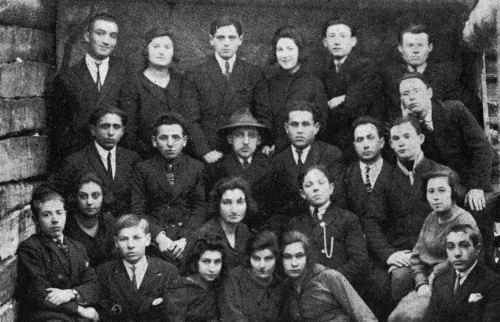 |
|
|
[Page 138]
By Moshe Sedletsky
(Original Language: Hebrew)
|
|
|
|
|
|
|
|
|
|
|
|
|||
|
|
|||
|
|
When the first news of the October 1917 Revolution reached Dereczin, a great joy erupted in the town, and demonstrations and holidays were proclaimed in honor of the great revolution.
Red flags were flown in public, and young people marched and sang revolutionary songs. With this great awakening, active people and the intelligentsia of the town began to set up parties, and give very inspiring speeches. It appeared to me that redemption has, finally, arrived.
An I, a lad of ten years age looked about me with wondering eyes: what happened here? According to my grandfather, Reb Abraham ז”ל, the Final Redemption would come with the arrival of a Messiah, Zion would be redeemed and the Hebrew tongue would be our tongue. If that were the case, then why, suddenly, are revolutionary songs being sung in Russian , and demonstrations being conducted in the streets of the town? As a little boy, I too, was caught up in the stream of exhilaration of the moment. I recollect the stormy debates that I listened to on the other side of my teacher's door, who boarded in my parents home, ז”ל. They would rule and debate how to bring the newfound freedom and redemption to the entire world, and to the masses of Jews, and I almost believed that the end to this lowly suffering was really at hand. I saw the stalwart young men, who had taken control of the town, joining the Red Army. News was spread to the effect that the assets of the wealthy were being distributed to the poor, a New World was upon us, everyone would equal, whether big or small, whether rich or poor.
This joy didn't last very long in our town. The Poles reached Dereczin, and the supporters of the revolutionary government fell back along with the
[Page 139]
retreating Red Army. The young people of the town began to emigrate across the ocean. The town became emptied of its youthful energies, and we began to hear about the pogroms in the Ukraine. Even in Dereczin, we felt the influence of these Halrachiks, who would cut off beards and side locks, and give beatings, which caused the Jews to lock themselves in their homes, fearing what the next day might bring. A sense of crisis weighed on the hearts of the young people, who saw in this that the redemption of Jewish people was yet far distant, yet many continued to err in following this fallacious cause. Left-wing Jewish movements went underground.
The Zionist movement was revitalized by the Balfour Declaration. Through the effort of several active people, the youth in town gathered together, displayed a blue and white flag, and sang songs. This great day remains guarded in my memory, a day in which our hope for the redemption of the Jewish people, once again, waxed strong.
We finished the Tarbut school that was established through the efforts of the educator, David Alper, ז”ל. We matured, and understood what we had to do and how to face the future, in order to realize our dreams of going to the Holy Land and joining those who were building the Homeland. In 1925, even before a chapter of HeHalutz was established in Dereczin, the first of the pioneers made aliyah. In 1926, we established the HeHalutz chapter, and began putting the KKL collection boxes into houses, and throughout the town, sympathy for the Zionist ideal grew. We initiated cultural work in our chapter. The arrival of the newspaper, Davar, which came to the Rabinovich home, was a major event for us. We would gather there, and read from the paper about events that took place in the Holy Land. We broadened the scope of our cultural activities, we set up classes for the study of the Zionist movement, for the Zionist-socialist workers' movement, and for the kibbutz movement in the Holy Land. We dreamed of emigration, getting certifies to leave, and aliyah. There were no organizations that facilitated emigration in our area, and it was at that time that we tried to put one together under the auspices of a “nobleman” who was know to be an eccentric, but this endeavor did not succeed. We began to look for work among the Jewish households. The only work was – cutting firewood, and even that work could be had only with great difficulty. It was no wonder that everyone agreed that “Jewish Children” would work at hard physical labor.
The events of 1929[1] led to a great awakening among the members of the HeHalutz chapter. The young people were ready to go join the defenders, but to our sorrow, their will did not prevail, but rather the refusal of their parents to let them go. Despite this, four members of the chapter did go in that year. In 1930, the HeHalutz chapter hit a crisis, with some of the members making aliyah, a few emigrated to Argentina, and only a small body of members remained to carry the burden of work in the chapter. The Betar movement was established, and most of the young people joined their ranks. The chapter became frozen. In order to generate membership interest that would strengthen the Zionist movement, we established Poalei Tzion, and several of the teachers joined its ranks, along with a number of the leaders from the ranks of the working class. This chapter was under the aegis of the HeHalutz chapter. In order to broaden our membership ranks, we opened evening classes in general subjects, and by this means, we succeeded in attracting the young workers to our ranks, as well as craftsmen, who left the non-Zionist organizations.
I recollect a Bund-sponsored meeting which several of us HeHalutz members attended, and after the presentations, we asked for time to speak. We said what we had to say, and when the moderator saw that our words had aroused some interest on the part of the listeners, he replied to us off the topic, jokingly, with words of the following nature: – the children of the rich play, each of them bringing the toys that they received – from their parents; a poor boy approaches and wants to join the play. So they ask him, what toys have you brought? The boy raises his shirt and says: I have a bellybutton, it croaks. Laughter broke out all over the auditorium. I was not embarrassed, and asked for permission to say a few words.
I said that I understood the implications of the
[Page 140]
moderator's remarks, but there is one thing that the Bundist moderator does not know, that he who transgresses gets his just desserts, and this is the same with the Jewish people, who will obtain redemption through return to our motherland, the Land of Israel, to derive sustenance from her. The audience applauded me, and a craftsman, known for his communist leanings clapped me on the shoulder, and said: “You've convinced me!” and he joined our sympathizers, and when we returned, he joined up with HeHalutz. We established a branch of The Worker and a number of the craftsmen [in town] joined this organization, among them S. Beckenstein, who was one of the workers in the branch.
To our great sadness, the gates of emigration closed, and our membership did not succeed in making aliyah. The mood of the town was not lacking in Zionist inclination. The movement to the Holy Land, and the work toward that objective grew in our town, Jews donated generously to Zionist causes and the interest in everything that transpired in the Holy Land was received with great interest.
In 1933, several members of the HeHalutz branch obtained permission to emigrate, a portion of them were fortunate enough to obtain proper certification, and another group went up with Aliyah Bet.
Not all of them succeeded in getting through, and many fell victim to the Nazis or as casualties fighting with partisans in the forests [during the Second World War].
May their memory be a blessing to us all!
Translator's Footnote:
[Page 141]
(Original Language: Hebrew)
|
|
|
|
|
|
|
|
|
|
|
|
|
|
|||
|
|
The Tarbut School was founded in 1918 by David Alper, ז”ל and [Schraga] Fyvel Einstein. It was a group of mothers, among them Fruma Bialosotsky, Rachel Shelovsky, Sarah Leah Gelman, and others, who turned to David Alper, ז”ל with a directive and a request to establish such a school. He responded willingly, and the institution was opened initially for first and second grades, with established pedagogical resources.
The Tarbut School obtained for its use, the physical resources that had been used by the German School during the occupation period of the First World War. The school did not wait for a building of its own [to begin functioning], even when it reached the point of running four and five grades, doing so in rented rooms, some of which were large, well-lit and airy, while others were too small and stuffy.
Despite this, the atmosphere in the classrooms was a good one, and the relationship between the students and their teachers was one of trust and respect.
Despite the shortage of adequate textbooks, the conduct of study took place properly, that is, Ivrit B'Ivrit (Hebrew taught in Hebrew). During recess time, which was held out of doors, the teachers mingled with the children, which contributed to the good atmosphere that prevailed among them. Not every house in which there was a school classroom had a gated yard; in those instances, the children spent their recess time in the street, and filled it with the chatter of play, and the sound of speech, peppered with Hebrew. The adults would pass by the children, with ears cocked toward them in wonderment, as they listened to the use of the Holy Tongue.
All the Jewish residents literally lived out the activities of the school: whenever there was a class in gymnastics (conducted out of doors for lack of an indoor facility) – many were curious enough to come and stand around the gymnasts; a walk or a tour, if it occurred through the town streets – would be accompanied by a throng of young people and adults; if a play or a celebration was being staged, either on a holiday or at year-end -- this became an event for the entire town.
Despite the difficulties of external life circumstances, the atmosphere inside the school was a good one. The teachers dedicated themselves, heart and soul to inculcate their charges with important disciplines: knowledge of the Hebrew language, love of the Tanach, love of the Land of Israel that was in the process of being reborn, and love of their fellow man.
The school lived every happening in the Holy Land: the defense of Tel-Chai; the death of [Joseph] Trumpeldor, and his companions; collection of tools for the Keren Poalei Eretz Yisrael. I am reminded of Abraham at the time the tools were being donated – and he was the youngest of the children – after the representatives of HeHalutz taking donations had left their home, and his father had given whatever he had given – he said that it was not enough, and secretly went to the assembly point and added a large axe that he took from his house.
At the end of the school year, there were final examinations given, in which the Headmaster David Alper himself participated, along with the officers of the school committee that consisted of parents who served with the Headmaster.
Even when David was a temporary visitor to Dereczin, he would frequently visit the school, and involve himself in lessons, testing the mettle of the class and individual students, testing one or two of them individually, in order to take a measure of their progress. He was a stickler for discipline, and it was not once that he took a student to task for not measuring up to his standards.
When David left the town to take a position in another city, it was the custom to wait for him at final examination time, because it was known that he would be returning to visit his parents during vacation.
Education professionals from nearby towns would come to the school, because it had garnered a reputation as a school with high standards in the district. We took great pride in the good name that the school appeared to have earned among our guests.
At the center of the school's educational endeavors
[Page 142]
were the initiatives undertaken on behalf of the KKL. In this respect, the efforts of the teacher, [Rabbi] Chaim Zvi Sinai-Miller ז”ל, were prominent. Pupils donated themselves, and solicited donations from others. On Yom Kippur Eve, they would set out a ‘Collection Plate’ at the entrance to the various synagogues for purposes of soliciting donations from those coming for the afternoon Mincha service.
It is clear, that the home of every father and mother was influenced by the atmosphere of the school, which was permeated with an international spirit, as the speech of the children rang with Hebrew. We accepted a Tarbut obligation on ourselves, to fulfill the Hebrew dictum even outside the walls of the school, and to elucidate its message among all the children, and assure its realization.
The Hebrew Lending Library was right beside the school, and the students ran it under the supervision of the teacher [Rabbi Chaim Zvi Sinai-]Miller ז”ל, and lent out books twice a week.
A youth movement named Agudat Trumpeldor also existed, and this was a long time before [the formation of] Betar.
On Lag B'Omer we satisfied the mitzvah of going out into the forest with bows and arrows, a parade led by the international flag, and a line of young people, mothers and their little kids tailed after, with the students marching decked out as Jewish pioneers, with songs of the Holy Land on their lips.
As for Tu B'Shevat, The Jewish Arbor Day, we celebrated that in the height of the Polish winter, in which the ‘fruits of the fifteenth’ when they did arrive, were accompanied by the singing of songs of Zion, and praises for the Holy Land and its fruit.
Kalman emphasizes: To this day he recalls the experience of learning stanzas of the poetry of [Chaim Nachman] Bialik and [Shaul] Tchernikhovsky from the mouth of the teacher, [Rabbi Chaim Zvi Sinai-]Miller ז”ל, those that had been put to music. The teacher, Sinai, with his endearing pedagogical approach, inculcated in each of us, a love of Zion, a love of the Hebrew language, and a love of Tanach.
Another adds: Every morning that we arrived at a class that took place in a gathering house, in which the teacher Sinai ז”ל, lived in a room, we found a saying from the Tanach on the blackboard, or a riddle.
It is important to take note that with the aliyah of the teacher, Sinai to the Holy Land, the school went into a decline that eventually led to its closing.
It is our responsibility to commemorate those teachers, who thanks to their efforts, we, the students of the Tarbut School are found here today:
David Alper – The founder and first Headmaster of the school, killed in the Holocaust in Pinsk soon after the fall of that city in 1941, when the German command ordered him to become the head of the Judenrat, and he refused. He was seized immediately, with his 14 year-old son, and taken out for execution.
Malka Alper – A resident in Israel since 1925.
Abraham Izaakovich – Went during the mid-1920s to live with his sons in the USSR, and our contact with him was lost.
Moshe Vankhutzker – Made aliyah during the 1930s and is today in Haifa.
Zvi (Grisha) Marminsky – An outstanding science and mathematics teacher. Later worked in a number of Tarbut schools in Poland. Killed in the Holocaust in Kharkov.
Shlomo (Solomon Rothstein) – A music teacher. Killed in the Holocaust in Slonim.
Zeydl Amiel – A citizen of Piesk. Died in the diaspora.
Yaffa Berzovsky – Made aliyah and settled in Kfar Eyn-Kharud.
And the last is our most beloved: Rabbi Chaim Zvi Miller-Sinai, who made aliyah with his family in the spring of 1926. Until the events of 12929, he was a resident in Kfar Uriah, and from then to his passing in 1963, he resided in Ramat HaSharon. His entire life in the Holy Land was literally the life of a Halutz – a pioneer.
Translator's Note:
[Page 143]
By Meir Bakalchuk
(Original Language: Yiddish)
|
|
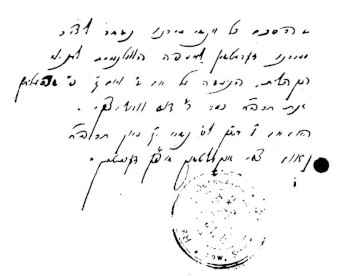 |
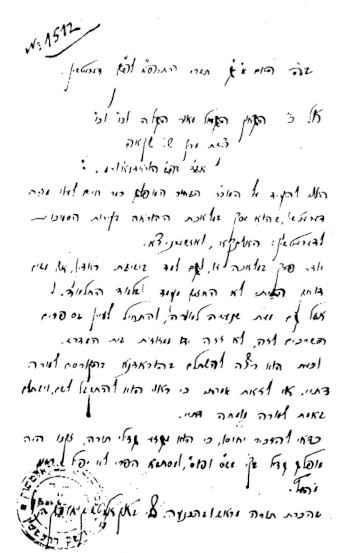 |
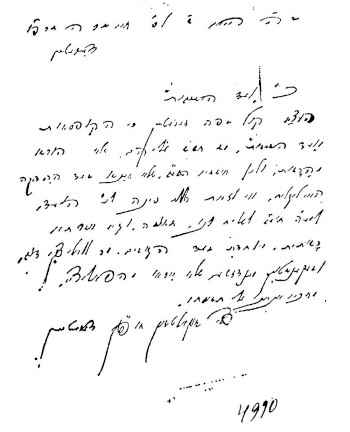 |
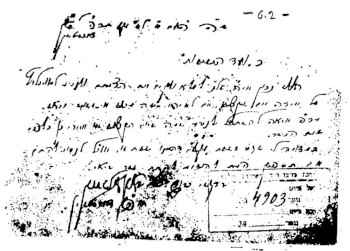 |
|
|
|||
My father, זצ“ל, the last Rabbi of Dereczin, dedicated his whole life to study and preaching. From the gray hours of the morning on, one heard his voice – he sat over his books and learned. It was his feeling that the well of Torah study had not yet been plumbed out, and he sat studying for long hours, over yet another line of reasoning, and a new insight.
My mother ז“ל, looked after her husband and her children, from the early morning hours until late at night, carrying out her duties as a housewife like a proverbial Woman of Valor. Every difficult problem that arose in our house, or in the family, was solved by her to the best of her abilities. I always felt that my mother could overcome any difficulty. She never asked anyone for help, and complained to no one.
My father came from the shtetl Sernik, near Pinsk. From childhood on, he demonstrated an inclination for Torah study, and he excelled in the development of his skills. My father was one of the first students of the Gaon, Rabbi Yossel Hurvich, the Head of the Novogrudok Yeshivah. Reb Yossel personally gave my father his ordination (smikha) as a Rabbi. Later, my father also studies with the Hafetz-Hayyim and received smikha from him as well.
I feel small and inadequate to the task, when I try to put down my father's character traits on paper. I know that I am not qualified to undertake this task. Who can describe the greatness, gentleness and persuasive personality of a Gaon, who was able to elicit commitment from anyone who came within the four walls of his presence.
Apart from his thorough expertise in the vast sea of Torah lore, and its commentaries, my father was also an accomplished mathematician, knowledgeable in history, literature and grammar. His sermons had a reputation throughout all of Poland. On the Sabbath between Rosh Hashana and Yom Kippur, and on the Great Sabbath before Passover, the synagogue would be packed with people who had come to hear his sermons, and for many months afterwards, his explanations and exegesis would continue to serve as themes for discussion.
His principal concern was to assure that Jewish children would study [the Torah], and he sunk a great deal of his energy into this. He was true to his calling, and organized a group called Tifereth LeBakhurim, and studied with selected students individually. When he detected a gift for scholarship in any young boy, he would not let him go, and tasked him to learn. There is more than one student, who achieved advanced cultural development, that owes thanks for such achievement to my father, the last Rabbi of Dereczin.
Over the course of decades, my father wrote extensive Torah commentaries. During this time, packages of his manuscripts accumulated. This would have been a very substantial contribution to the Masoretic literature. He had continuously hoped to submit this work for publication, but so much [raw material] had been amassed, that it would have been an overwhelming effort to prepare it for printing.
In the [final] fateful days of the town, he found a hiding place for his creations, in a corner of the attic. Witnesses give testimony that he had approached a number of the balebatim, and asked that his work be made public if any of them remained alive.
This work subsequently was consumed by fire
[Page 144]
amidst the general destruction that ensued.
My father did not occupy himself with money matters, and would not have recognized a coin of the realm had he seen it. The material side of existence for him was merely a means to provide necessary sustenance, in order to serve his Maker and the congregation. The one to whom these concerns fell was my mother, and this was not easy for her, because, just as was the case in all rabbinical households in Poland, we did not have much of an income.
My father was nationalistically Jewish, and proud of his identity as a member of the Jewish people. Back in the days of the First World War, when he was the Rabbi of Stolovich, near Baranovich, he hosted the Catholic Archbishop, religious leader of the Polish community, during the time of the Soviet occupation. My father held that a person of such high rank in a second religion should be accorded the dignity of a reception with great respect. Apparently the Catholic leader said certain things, perhaps that he should not have, because when he arrived in Gorodishch he was arrested. He was condemned to death. My father then presented himself to the Soviet authorities, and he was afforded an opportunity to explain to the Bolsheviks, that the Archbishop did not malign the authorities, but rather said a prayer in accordance with Catholic ritual. The priest was set free.
A year afterwards, when a stable Polish regime had been established in our area, my father was invited to see the Polish President, Wojieczowski, who thanked my father for what he had done, and offered him a concession in either tobacco or alcohol – a business from which it would have been possible to become rich in those days. My father, a proud Jew, did not accept this offer, saying that a Rabbi does not accept compensation for his humanitarian deeds. The Polish officials were literally stunned to see this forthright Jew before them. My father was awarded a medal of high rank, but I do not recall him ever making use of it for his own interest.
During the 1930s, my father was formally invited to occupy a pulpit in Baltimore, Maryland in America. After considerable wrestling with this matter, he declined this offer as well. He couched his refusal to take the offer in the thought that he had lived the better part of his life in Dereczin, where he had his family, and grandchildren who come to see him every morning, to wish him a good morning before he goes off to the synagogue to study, and he is very comfortable and satisfied with his congregation and his family. I remember to this day, how my father used to stand at the window each morning, waiting, until his grandchildren appeared on the little hill between the Old Synagogue and the Bialosotsky family's house.
“Here they come running, my little birds,“ – my father would say with great affection. And not only once did he complain: “In America, I would be a Rabbi by position, not because Jewish people need me, but rather because a Jewish community has to have a Rabbi.
Here, in Dereczin, I am needed. There is always a Jewish person [here] in need of some advice, an answer to a question, a specific form of assistance. And here, I always find a Jew with whom I can carry on a conversation, or to study a page of Gemara with him. I will not leave Dereczin…“
It was in this way that my father, the last Rabbi of Dereczin, together with my mother, that righteous woman, perished in Treblinka. The two, beloved and faithful to each other in life, were not parted even in death.
|
|
JewishGen, Inc. makes no representations regarding the accuracy of
the translation. The reader may wish to refer to the original material
for verification.
JewishGen is not responsible for inaccuracies or omissions in the original work and cannot rewrite or edit the text to correct inaccuracies and/or omissions.
Our mission is to produce a translation of the original work and we cannot verify the accuracy of statements or alter facts cited.
 Derechin, Belarus
Derechin, Belarus
 Yizkor Book Project
Yizkor Book Project
 JewishGen Home Page
JewishGen Home Page
Copyright © 1999-2025 by JewishGen, Inc.
Updated 29 Aug 2022 by JH